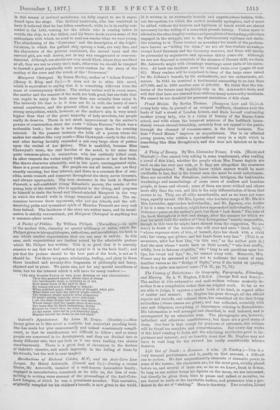Margaret Chetwynd. By Susan Morley, author of "Aileen Ferrers." (Henry
S. King and Co.) — It does not do to skim this novel, which is equivalent to saying that it is something different from the mass of contemporary fiction. The author writes well in every sense, the matter and the manner of the work are both good, but one feels that one ought to enjoy the book more than one actually does enjoy it. The leisurely life that is in it does not fit in with the hurry of one's actual experience, and the general effect is too smooth to call out strong sympathies, which, however, as the author's aim is very much higher than that of the great majority of lady novelists, her people really do deserve. There is not much improvement in the author's powers of construction since she wrote "Aileen Ferrero," which was a noticeable book ; but she is not dependent upon them for creating interest. In the present instance she kills off a person whom she makes her readers like very much—Miss Chetwynd—early in the story, and after having lavishly expended a not very large store of pathos upon the recital of her history. This is unskilful, because Miss Chetwyntrs niece, the real heroine of the novel, is for some time quite common-place, in comparison with her suddenly killed aunt. In other respects the writer amply fulfils the promise of her first book. She draws character admirably, and in her quiet, unexaggerated style, there is a great attraction. Her people are not all heroic, nor are they exactly amusing, but they interest, and there is a constant flow of sen- sible, acute remark and comment throughout the story, never tiresome, and always appropriate. The best character in the book is Maurice Prescott, a self-confident young Ritualistic parson, the cousin of the young lady of the manor, who is appointed to the living, and proposes to himself to train the broad and liberal-minded Margaret in the way in which she should walk in things temporal and spiritual. The en- counters between these opponents, who yet are friends, and the self- deceiving pride and tyrannical spirit of Maurice Prescott are very well done indeed. The incidents of the story are rather tame, and its termi- nation is strictly conventional, yet Margaret Chetwynd is anything but a common-place novel.






































 Previous page
Previous page